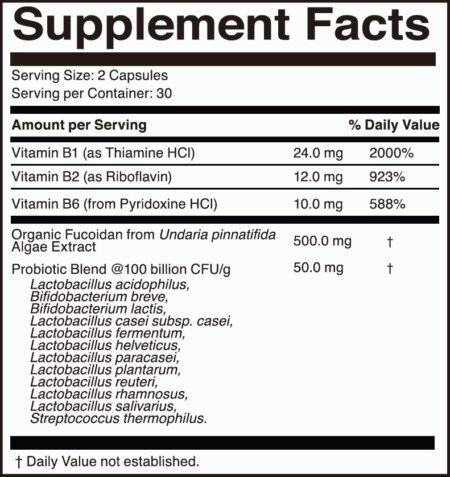Energy is crucial, and it is in everything that we eat, consume, or use. Energy fuels and normalizes the body’s natural internal functions, including basal metabolism, metabolic responses to food, physical activity, growth, pregnancy, lactation, and many more.(1) Energy helps to repair cells, and body tissue is used to develop muscle and is necessary to sustain internal balance (homeostasis).(2)
Eleven B-complex vitamins work collectively, and some of the best for energy include B1, B2, and B6. The human body is constantly looking for ways to obtain energy, and if the body does not receive the proper amounts, you start getting the effects of fatigue. For the body to achieve its daily targets or goals, energy is vital, and sometimes a vitamin deficiency may not allow you to perform at your best.
The truth is that the body can also obtain energy from other nutrients, like polysaccharides. For example, the most abundant polysaccharides are carbohydrates in food, and they are abundant in brown seaweeds. One very unique polysaccharide found in brown seaweeds is Fucoidan. This bioactive ingredient has been known for supporting the immune system, but it can also help create sustained energy for your body. Now imagine the energy boost you can obtain from combining these essential B-complex vitamins (B1, B2, and B6) plus the fantastic health benefits of Fucoidan.
(1) James, W.P.T. & Schofield, E.C. (1990). Human energy requirements. A manual for planners and nutritionists. Oxford, UK, Oxford Medical Publications under arrangement with FAO.
(2) Bruce Alberts, Alexander Johnson, Julian Lewis, Martin Raff, Keith Roberts, and Peter Walter (2002). Molecular Biology of the Cell. 4th edition.
Four Energy Boosting Ingredients: B-Complex Vitamins and Fucoidan
Vitamin B1 – Thiamine
Thiamine is involved in the process of breaking down carbohydrates. Therefore, a high carbohydrate diet increases the demand for vitamin B1. In addition, vitamin B1 increases the production of stomach acid needed for digestion and is necessary for muscle tone in the stomach and intestines.(3)
Thiamine is also necessary for growth, fertility, lactation, and normal functioning of the heart and nervous system. Some of the vitamin B1 deficiency symptoms include fatigue and loss of appetite, and other problems with the nervous system and gastrointestinal tract.(4)
(3) Londsdale, D. (2006). A Review of the Biochemistry, Metabolism and Clinical Benefits of Thiamin(e) and Its Derivatives. Evid Based Complement Alternat Med. 2006 Mar; 3(1): 49–59.
(4) World Health Organization (2002). Thiamine deficiency and its prevention and control in major emergencies.
Vitamin B2 – Riboflavin
Vitamin B2 is the key building block for various reactions involved in energy production and other metabolic pathways like carbohydrate, lipid, and protein metabolism (5). Like vitamin B1, riboflavin is vital in maintaining the body’s energy balance. Riboflavin facilitates the conversion of carbohydrates into adenosine triphosphate (ATP). The human body produces ATP from food, and ATP produces energy as the body requires it (6).
It is essential to mention that vitamin B2 contributes to the formation of blood cells and improves iron absorption. Therefore, vitamin B2 is necessary for women with anemia, making people with this condition feel tired and weak. Anemia develops when there are not enough red blood cells in the body to carry oxygen (7).
(5) Pinto, J.T. (2013). Riboflavin (Vitamin B2). Handbook of Vitamins, Fifth Edition (pp.191-266).
(6) Suwannasom, N., et al. (2020). Riboflavin: The Health Benefits of a Forgotten Natural Natural Vitamin. International Journal of Molecular Sciences.
(7) U.S. Department of Health and Human Services. National Institutes of Health. Your Guide to Anemia.
Vitamin B6 – Pyridoxine
Vitamin B6 is involved in more than 150 chemical reactions in the body. In addition, it is active in the metabolism of carbohydrates to produce energy to sustain all these chemical reactions. Other uses of vitamin B6 include morning sickness, PMS, and menopause for both emotional and physical symptoms, carpal tunnel syndrome, edema, birth control pills-induced deficiencies, and the reduction of homocysteine, a toxic amino acid metabolite associated with heart disease.(8)
Vitamin B6 deficiency may potentially contribute to tiredness and fatigue. It is partly because vitamin B6 is involved in the production of melatonin (the sleep-promoting hormone).(9)
(8) Stach, K., et al. (2021). Vitamin B6 in Health and Disease. Nutrients, 13, 3229.
(9) Erland, L. A., and Saxena, P. K. (2017). Melatonin Natural Health Products and Supplements: Presence of Serotonin and Significant Variability of Melatonin Content. J Clin Sleep Med. 13(2):275-281.
Fucoidan (Brown seaweed extract)
Fucoidan is a sulfated polysaccharide derived from brown seaweeds, primarily Mozuku, Mekabu, and Fucus. Some of the main monosaccharides in Fucoidan include glucose, galactose, mannose, and fucose. Monosaccharides are the simplest form of carbohydrates. They are easily absorbed in the intestine, and the primary function of monosaccharides is to produce and store energy.(10)
In one study, Fucoidan showed anti-fatigue activity by decreasing plasma lactate and ammonia levels and increasing serum glucose. Unfortunately, blood ammonia significantly increases in liver and advanced cancers (due to the rigorous treatments). At the same time, people with exercise-induced fatigue also have high levels of ammonia.(11) Since Fucoidan is an excellent antioxidant, it prevents free-radical damage and provides an anti-fatigue function.
(10) Nayak, K. (2021). Biological Macromolecules. Bioactivity and Biomedical Applications.
(11) Chen, Y.M., et al. (2015). Nutrients. 7(1): 239–252. Fucoidan Supplementation Improves Exercise Performance and Exhibits Anti-Fatigue Action in Mice.
How Does Fucoidan and B-Complex Vitamins Boost Your Energy Levels
Polysaccharides, like Fucoidan, and human health are indistinguishably linked and interconnected. If there are no polysaccharides in our food, in our tissues and veins, we could not exist. To maintain a functional body, reduce pain, heal wounds, and to feel energized polysaccharides are very important.(12) Polysaccharides are a class of carbohydrates that offer many different properties and essential functions to sustain living organisms. They serve as sources and storage of energy and form the supporting tissue of plants and some animals. Carbohydrates deliver the body glucose, which is converted to energy used to support bodily functions and physical activity. In the case of Fucoidan, it delivers high levels of fucose and galactose, which are also essential monosaccharides.(13) Galactose is a simple sugar that is generally transformed in the liver before being used up as energy. This sugar is quite abundant in human diets and helps in a number of functions. Because galactose is a precursor to glucose production, it is an important energy-providing nutrient.(14) In the case of fucose, it is a key component to activate the immune system, and its consumption has been linked to the establishment of a healthy gut flora.
Fatigue and lack of energy occur when regular functions in your body cannot be maintained, and the organs do not remain in favorable working conditions. Fatigue is still difficult to define because it may happen for many reasons. For example, some people may feel fatigued due to changes in metabolism, others because of health conditions like anemia, or perhaps chronic diseases like cancer, vitamin deficiencies, and still others that occur due to hormonal issues with the central nervous system or even physical fatigue.(15) Several studies have reported that substances with anti-fatigue activity are mainly derived from polysaccharides (like Fucoidan), proteins, peptides, and other small molecular substances.
Therefore, the consumption of foods that are considered an energy source like Fucoidan and the B-complex vitamins may ultimately support overall metabolism and provide the body with sustained energy levels. Plus, let’s not forget the great benefits of Fucoidan as an immune-enhancer and antioxidant. B-Complex vitamins B1, B2, and B6 are energy vitamins and stress fighters. They get this reputation because they act as cofactors in converting carbohydrates into glucose, which in fact support the biochemical synthesis of more energy by also supporting the internal use of other carbohydrates or polysaccharides like Fucoidan. This combination incorporates the health benefits of Fucoidan and the functionality of B-complex vitamins, which the body utilizes to produce energy.
(12) Lovegrove, A., et al. (2017). Role of polysaccharides in food, digestion, and health. Crit Rev Food Sci Nutr. 57(2): 237–253.
(13) Mabate, B., et al. (2021). Fucoidan Structure and Its Impact on Glucose Metabolism: Implications for Diabetes and Cancer Therapy. Mar Drugs. 19(1): 30.
(14) Conte, F., et al. (2021). Galactose in human metabolism, glycosylation and congenital metabolic diseases: Time for a closer look. BBA – General Subjects 1865.
(15) Cheng, A.J., and Rice, C.L. (2010). Fatigue-induced reductions of torque and shortening velocity are muscle dependent. Med. Sci. Sports Exerc. 42:1651–1659.

